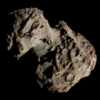7P/Pons–Winnecke
 Contemporary 1921 illustration of Pons–Winnecke comet.[1] | |
| Discovery | |
|---|---|
| Discovered by | Jean Louis Pons & Friedrich Winnecke |
| Discovery date | June 12, 1819 & March 9, 1858 |
| Designations | |
| 1858 E1, 1858 II, 1819 III, 1927c, 1933b, 1939c, 1945a, 1951c, 1964b, 1970b, 1976f, 1983b, 1989g | |
| Orbital characteristics | |
| Epoch | May 6, 2002 |
| Aphelion | 5.611 AU |
| Perihelion | 1.257 AU |
| Semi-major axis | 3.434 AU |
| Eccentricity | 0.634 |
| Orbital period | 6.37 a |
| Inclination | 22.28° |
| Last perihelion | January 30, 2015[2][3] September 26, 2008 |
| Next perihelion | 2021-May-27[4] |
| Earth MOID | 0.24 AU (36 million km) |
| Physical characteristics | |
| Dimensions | 5.2 km[5] |
| Perihelion distance at different epochs[4] | |||||||
| Epoch | Perihelion (AU) | ||||||
|---|---|---|---|---|---|---|---|
| 1819 | 0.77 | ||||||
| 1875 | 0.83 | ||||||
| 1886 | 0.89 | ||||||
| 1898 | 0.92 | ||||||
| 1909 | 0.97 | ||||||
| 1921 | 1.04 | ||||||
| 1933 | 1.10 | ||||||
| 1945 | 1.16 | ||||||
7P/Pons–Winnecke (also known as Comet Pons–Winnecke) is a periodic Jupiter-family comet with a 6 year orbit. Early calculations for the 1921 apparition suggested that the orbit of the comet might collide with Earth in June, but observations on April 10 ruled out an impact.[1] It made a very close approach to Earth in June 1927.[6] The outward migration of perihelion created impressive meteor showers in 1916, 1921, and 1927.[7]
The next perihelion passage is 27 May 2021 when the comet will have a solar elongation of 107 degrees at approximately apparent magnitude 11.[2] It will pass 0.44 AU (66 million km) from Earth on 12 June 2021.
The last perihelion was on January 30, 2015,[2] and at the 2015 perihelion it had a solar elongation of 24 degrees.[8]
Jean Louis Pons (Marseille) originally discovered the comet on June 12, 1819, it was later rediscovered by Friedrich August Theodor Winnecke (Bonn) on March 9, 1858. It is the parent body of the June Bootids of late June.
7P has an orbital period of 6.37 years. It has a perihelion of 1.3 AU and an aphelion of 5.6 AU (past the orbit of Jupiter). It passed within 0.04 AU (6.0 million km; 16 LD) of Earth in June 1927, and 0.1 AU (15 million km) in 1939;[9] but it will not come as close in the 21st century. A close approach to Jupiter in July 2037[9] will drop perihelion back to 0.982 AU.
The comet nucleus is estimated at about 5.2 km in diameter.[5]
References
- ^ a b Popular Science July 1921
- ^ a b c Seiichi Yoshida (2013-12-14). "7P/Pons-Winnecke". Seiichi Yoshida's Comet Catalog. Retrieved 2014-10-29.
- ^ Patrick Rocher (2008-12-23). "Note number : 0039 P/Pons-Winnecke : 7P". Institut de mécanique céleste et de calcul des éphémérides. Retrieved 2012-02-19.
- ^ a b "7P/Pons-Winnecke". Minor Planet Center. Retrieved 2019-03-05.
- ^ a b "JPL Small-Body Database Browser: 7P/Pons-Winnecke" (last observation:2014-03-28). Jet Propulsion Laboratory. Retrieved 2010-02-25.
- ^ http://cometography.com/nearcomet.html
- ^ Kronk, Gary W. "7P/Pons-Winnecker". Retrieved 2019-03-05. (Cometography Home Page)
- ^ "Elements and Ephemeris for 7P/Pons-Winnecke". Minor Planet Center. Archived from the original on 2014-10-29. Retrieved 2014-10-29. (0007P)
- ^ a b "JPL Close-Approach Data: 7P/Pons-Winnecke" (last observation: 2014-03-28). Retrieved 2008-03-22.
External links
- Orbital simulation from JPL (Java) / Horizons Ephemeris
- Elements and Ephemeris for 7P/Pons-Winnecke – Minor Planet Center
- 7P/Pons-Winnecke – Seiichi Yoshida @ aerith.net
- 7P – Gary W. Kronk's Cometography
- article on the nuclei of 7P, 14P, and 92P


